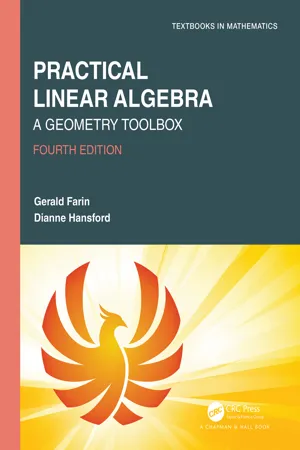
- 592 pages
- English
- ePUB (mobile friendly)
- Available on iOS & Android
About this book
Linear algebra is growing in importance. 3D entertainment, animations in movies and video games are developed using linear algebra. Animated characters are generated using equations straight out of this book. Linear algebra is used to extract knowledge from the massive amounts of data generated from modern technology.
The Fourth Edition of this popular text introduces linear algebra in a comprehensive, geometric, and algorithmic way. The authors start with the fundamentals in 2D and 3D, then move on to higher dimensions, expanding on the fundamentals and introducing new topics, which are necessary for many real-life applications and the development of abstract thought. Applications are introduced to motivate topics.
The subtitle, A Geometry Toolbox, hints at the book's geometric approach, which is supported by many sketches and figures. Furthermore, the book covers applications of triangles, polygons, conics, and curves. Examples demonstrate each topic in action.
This practical approach to a linear algebra course, whether through classroom instruction or self-study, is unique to this book.
New to the Fourth Edition:
- Ten new application sections
- A new section on change of basis. This concept now appears in several places
- Chapters 14-16 on higher dimensions are notably revised
- A deeper look at polynomials in the gallery of spaces
- Introduces the QR decomposition and its relevance to least squares
- Similarity and diagonalization are given more attention, as are eigenfunctions
- A longer thread on least squares, running from orthogonal projections to a solution via SVD and the pseudoinverse
- More applications for PCA have been added
- More examples, exercises, and more on the kernel and general linear spaces
- A list of applications has been added in Appendix A
The book gives instructors the option of tailoring the course for the primary interests of their students: mathematics, engineering, science, computer graphics, and geometric modeling.
Tools to learn more effectively

Saving Books

Keyword Search

Annotating Text

Listen to it instead
Information
1Descartes' Discovery
An army was approaching Schilda and would likely conquer it. The town council, in charge of the town treasure, had to hide it from the invaders. What better way than to sink it in the nearby town lake? So the town council members board the town boat, head for the middle of the lake, and sink the treasure. The town treasurer gets out his pocket knife and cuts a deep notch in the boat's rim, right where the treasure went down. Why would he do that, the other council members wonder? “So that we will remember where we sunk the treasure, otherwise we'll never find it later!” replies the treasurer. Everyone is duly impressed at such planning genius!Eventually, the war is over and the town council embarks on the town boat again, this time to reclaim the treasure from the lake. Once out on the lake, the treasurer's plan suddenly does not seem so smart anymore. No matter where they went, the notch in the boat's rim told them they had found the treasure!
Table of contents
- Cover
- HalfTitle Page
- Series Page
- Title Page
- Copyright Page
- Dedication Page
- Contents
- Preface
- 1 Descartes' Discovery
- 2 Here and There: Points and Vectors in 2D
- 3 Lining Up: 2D Lines
- 4 Changing Shapes: Linear Maps in 2D
- 5 2 × 2 Linear Systems
- 6 Moving Things Around: Affine Maps in 2D
- 7 Eigen Things
- 8 3D Geometry
- 9 Linear Maps in 3D
- 10 Affine Maps in 3D
- 11 Interactions in 3D
- 12 Gauss for Linear Systems
- 13 Alternative System Solvers
- 14 General Linear Spaces
- 15 Eigen Things Revisited
- 16 The Singular Value Decomposition
- 17 Breaking It Up: Triangles
- 18 Putting Lines Together: Polylines and Polygons
- 19 Conics
- 20 Curves
- A Applications
- B Glossary
- C Selected Exercise Solutions
- Bibliography
- Index
Frequently asked questions
- Essential is ideal for learners and professionals who enjoy exploring a wide range of subjects. Access the Essential Library with 800,000+ trusted titles and best-sellers across business, personal growth, and the humanities. Includes unlimited reading time and Standard Read Aloud voice.
- Complete: Perfect for advanced learners and researchers needing full, unrestricted access. Unlock 1.4M+ books across hundreds of subjects, including academic and specialized titles. The Complete Plan also includes advanced features like Premium Read Aloud and Research Assistant.
Please note we cannot support devices running on iOS 13 and Android 7 or earlier. Learn more about using the app